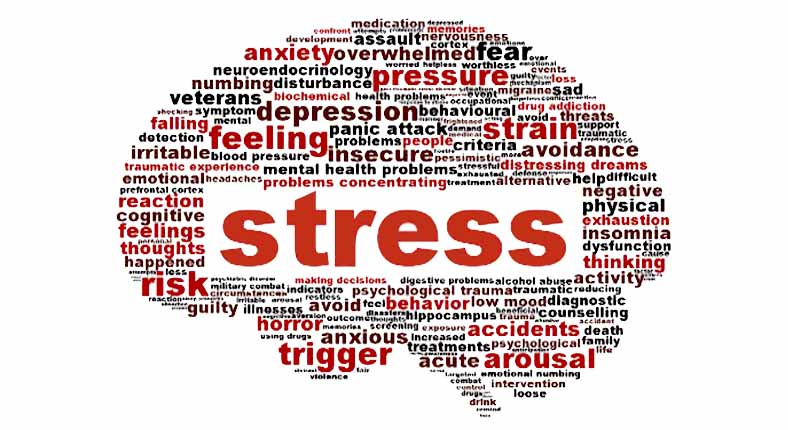Last Updated:
April 25th, 2025
Stress and Addiction | Symptoms and Treatment Options
Stress can feel like a relentless tide, pulling you under no matter how hard you try to stay afloat. For some of us, substances like drugs or alcohol can feel like a lifeline, a way to block out the noise for a moment and catch a breath. But that lifeline can become a noose, tightening as addiction takes hold and your stress multiplies. At Recovery Lighthouse, we understand how these struggles intertwine but we can help you unravel them. With our support, you will learn to face life’s pressures healthily, unlocking a path to sustainable peace and inner calm.

What is stress?
Stress is your body’s built-in survival system, built to fire up when you need to handle life’s challenges. When the pressure’s on – whether it’s a tough meeting, an unexpected bill or juggling a million responsibilities – stress is what helps you stay sharp and focused in the moment.
In moderation, stress is not all bad, as it can push you to perform and adapt. But what is meant to be a short-term boost can turn into a long-term burden when stress lingers. At the heart of it all is cortisol, the hormone that fuels your fight-or-flight response. While a little cortisol can be helpful in tough situations, too much for too long can wear you out. Chronic stress doesn’t just rattle your mind; it can affect everything from your sleep to your health and make everyday life unbearable.
What is the difference between stress and chronic stress?
Whereas stress is like a wake-up call to get something important done, chronic stress is a broken clock that leaves you stuck on repeat. Chronic stress can make it seem like your problems are both endless and unsolvable. This feeling can become a massive weight that drags you down and strangles all happiness out of life.
The effects of chronic stress can be far-reaching, including weakened immunity, sleep issues, anxiety and depression. One survey in the UK found that 74% of adults felt so overwhelmed by stress at least once a year that they couldn’t cope, with 32% experiencing suicidal thoughts and 16% resorting to self-harm. These figures highlight just how important it is to distinguish between short-term stress and the harmful impact of chronic stress and to seek support when it’s needed.
How to spot the danger signs of stress
As some amount of stress is completely normal, it can be easy to miss chronic stress symptoms and think everything is fine. Here are some signs of stress which could point to a bigger problem than you realise:
- Feeling constantly tired, even after resting
- Struggling to fall asleep or stay asleep at night
- Frequent headaches, body aches or muscle tension
- Having mood swings or snapping at loved ones without reason
- Finding it difficult to focus or complete simple things
- Big changes in your appetite, like overeating or not feeling hungry
- Getting sick more often because your immune system feels weaker
- Feeling overwhelmed by even small responsibilities
- Experiencing ongoing anxiety or sadness that doesn’t seem to lift
If you notice these chronic stress symptoms, professional help can prevent them from spilling over and causing lasting harm.
How do chronic stress and addiction link?
When chronic stress feels like a never-ending battle, it is only natural to seek relief. A glass of wine at the end of a stressful day or another substance to take the edge off can seem harmless, but you are often just plastering over a deeper wound.
Instead of resolving the causes of your stress, addiction can create a whole new set of problems, including health issues, problems in your relationships and financial trouble. This often leads to a harmful cycle with stress pushing you toward addiction and addiction piling on even more stress.
When both a mental health issue and addiction occur together, it is called a dual diagnosis and it can be especially challenging to untangle. At Recovery Lighthouse, we see clients suffering from various forms of addiction, and stress is often one of the biggest causes and symptoms:
Stress and alcohol addiction
When stress feels unrelenting, alcohol can seem like an easy way to unwind. But over time, that escape becomes a dependency and the stress you are trying to manage only multiplies with the challenges of addiction.
Stress and drug addiction
Drugs, both prescription and illegal, can promise a quick escape from stress, numbing the pain or boosting your energy so you can keep going. Unfortunately, this often leads to addiction, with stress and drug abuse fuelling each other.
Stress and behavioural addiction
When life feels out of control, gambling, gaming, sex, and shopping can all seem like a way to cope or regain a sense of control. Over time, however, these habits can become addictive, adding a whole host of new issues to try and deal with.

Treatment options for chronic stress and addiction
At Recovery Lighthouse, we understand that addiction and stress are tightly wound together, each feeding off the other. Our rehab treatment programme will peel back the layers of your addiction to deal with it at its most fundamental level. The therapies you undergo during rehab will have major benefits for your stress management which will not just help with addiction but in every important area of your life.
Here are some of our most important treatment approaches:
- Group therapy: Group therapy is like a safe harbour in the storm of stress and addiction. Surrounded by people who understand your struggles, you will share stories, pick up practical tips and build a network of encouragement for when life gets chaotic.
- One-on-one therapy: One-on-one therapy gives you the chance to work through the personal stressors driving your addiction and stress. Your therapist will help you create a tailored roadmap to navigate life’s challenges so that you never get overwhelmed again.
- Behavioural therapy: Evidence-based behavioural therapies like CBT and DBT are your secret weapons against stress. These therapies help you spot the unhelpful patterns that stress and addiction thrive on and replace them with healthier, more empowering ways to respond to whatever is going on in your life.
- Family therapy: Addiction and stress can tear families apart but family therapy is the glue that starts putting things back together. With honest conversations and guided healing, it is a chance to rebuild trust and create a support system that lasts.
- Holistic therapies: Stress and addiction affect every part of you so we take care of every part of you. With yoga to release tension, meditation to quiet your mind and creative outlets like art therapy, you will find balance, relief and moments of joy on your recovery journey.
- Aftercare and post-rehab support: The world doesn’t stop spinning once rehab ends and neither does our support. Through weekly outpatient group therapy, a personalised plan for relapse prevention and the collective strength of our Alumni Network, you will have a lifeline whenever stress threatens a relapse.
Get help for stress and addiction today
The weight of stress and addiction can feel crushing, but you don’t have to carry it alone. Recovery Lighthouse can help take the weight off so you can begin a life of calm and clarity. Through our comprehensive treatment programmes, we will help break the link between addiction and stress for a sober, satisfying future. Contact us today, and let’s build that future together.
Frequently Asked Questions
(Click here to see works cited)
- Mental Health Foundation. “Stressed nation: 74% of UK ‘overwhelmed or unable to cope’ at some point in the past year.” Mental Health Foundation, https://www.mentalhealth.org.uk/about-us/news/survey-stressed-nation-UK-overwhelmed-unable-to-cope.
- UK Rehab. “Dual Diagnosis | Co-Occurring Disorders.” UK Rehab, https://www.uk-rehab.com/mental-health/dual-diagonosis/. Accessed 11 December 2024.
- UK Rehab. “Stress and Addiction | Mental Health and Addiction.” UK Rehab, https://www.uk-rehab.com/mental-health/stress-and-addiction/. Accessed 11 December 2024.
- Sinha, Rajita. “Chronic stress, drug use, and vulnerability to addiction.” Annals of the New York Academy of Sciences vol. 1141 (2008): 105-30. doi:10.1196/annals.1441.030


